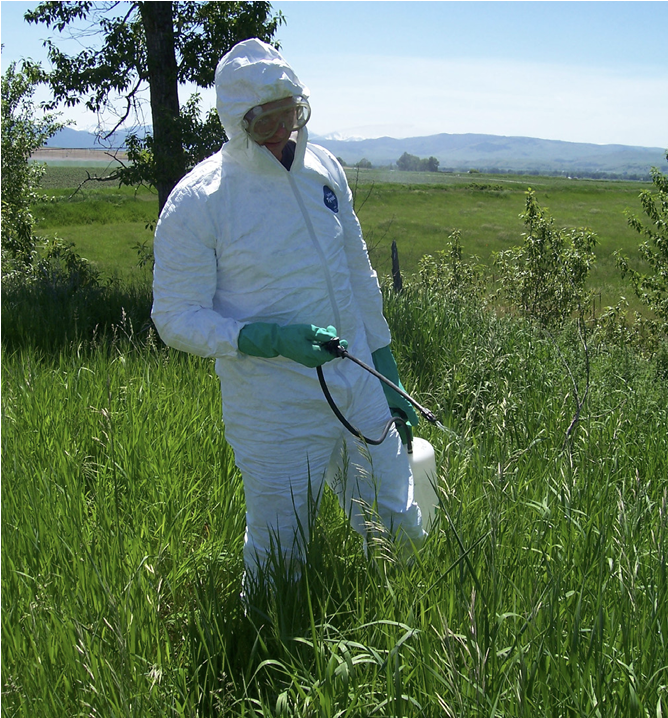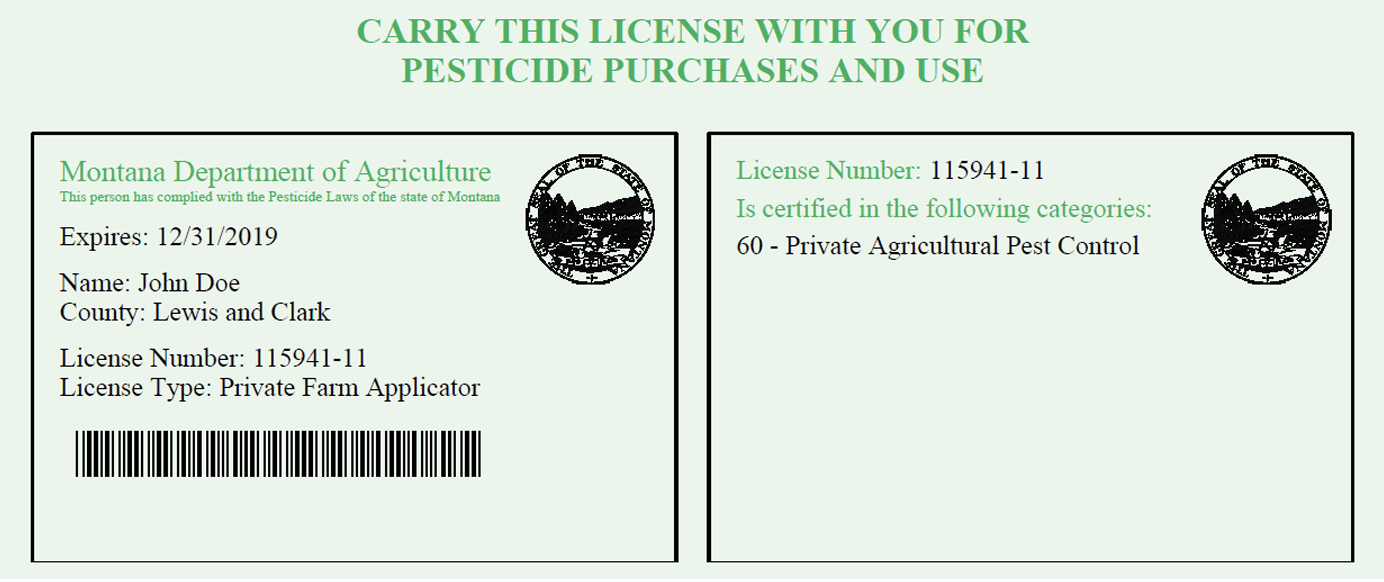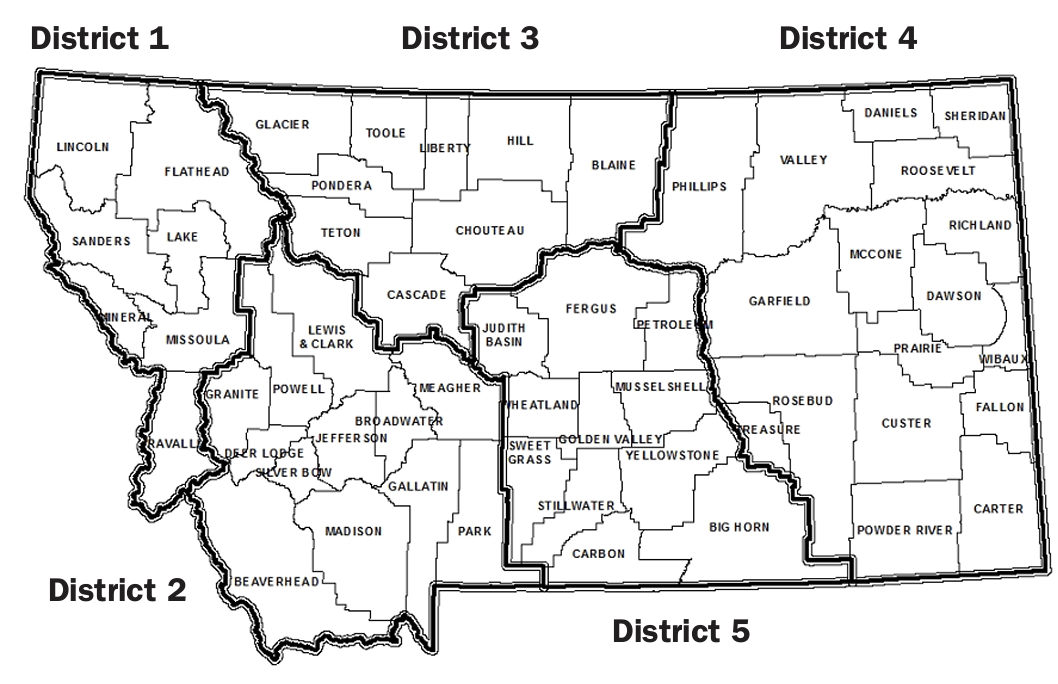The Montana Private Applicator Program
Agriculture and Natural Resources
MT200809AG
Revised September 2023
By Cecil Tharp, MSU Extension Pesticide Education Specialist, and Amy Bowser, MSU Extension Pesticide Education Technician
The Montana State University Extension Pesticide Education Program (PEP) coordinates the certification of private applicators, also known as farm applicators, across the state. A private applicator is defined by the State of Montana as an applicator who uses or supervises the use of any restricted-use pesticide for the purpose of producing an agricultural commodity on property owned, rented or leased by the applicator. Pesticide applicators wanting to purchase or use restricted-use pesticides on their property should read this publication.
PESTICIDES ARE AN IMPORTANT TOOL FOR MANY MONTANA farmers, ranchers, and landowners. Many commonly used ‘general use’ pesticides can be purchased without a license and used on personal property. These pesticides do not generally cause unreasonable adverse effects on human health or the environment and include such products as Ortho, Sevin® and Roundup®. Other restricted-use pesticides are more strictly regulated and require a license to purchase or apply due to the potential adverse effects these products may have on the environment, non-target animals or human health. Restricteduse pesticides include such products as Tordon 22K®, Warrior 1E® and many more.
There are many things a certified private applicator cannot do that are often misunderstood. Certified private pesticide applicators cannot apply pesticides commercially, can only apply restricted-use pesticides on land they own, rent or lease, and cannot sell or give away pesticides. Finally, a certified applicator cannot give their license to non-family members or non-employees to purchase or apply restricted-use pesticides.
For more information on non-private (commercial, governmental, or non-commercial) certification contact the Montana Department of Agriculture (MDA), (406) 444-4900, for further details.

Private Applicator Certification
To become certified as a private applicator for the first time, you must either attend an approved Initial Private Applicator Training or pass the open-book Montana Private Applicator Certification Exam with a grade of 70% or better. This exam is offered at all local MSU Extension offices and must be administered by a Private Applicator Training (PAT) Coordinator (generally the MSU Extension Agricultural Agent). Initial Private Applicator Trainings offered throughout Montana are posted at montana.edu/extension/pesticides/events.
After qualifying for certification, a completed ‘Farm Applicator Special Use Permit’ must be sent with the appropriate license fees to the MDA. The MDA will then mail the private applicator license within three weeks. A PAT Coordinator may issue a temporary permit to allow the purchase of restricteduse pesticides as soon as possible, provided it is the first time a license is applied for. If the license has not been received within three weeks, contact the MDA pesticide licensing division at (406) 444-4900 or the local PAT Coordinator (montana.edu/extension/pesticides/pat/patcolist.html).
Private Applicator License Fees
The fee for private pesticide applicators is $60 per five-year recertification cycle and is distributed as:
- $15 (25%) to the MDA for administration.
- $25 (42%) to the local MSU Extension office where the private applicator resides. This money is used to support pesticide certification and training programs conducted in those counties.
- $5 (8%) to the MSU Pesticide Education Office.
- $15 (25%) to the MDA Waste Pesticide and Pesticide Disposal Program.
The fee is prorated over a five-year recertification cycle with each year worth $12. For example, an initial applicator paying fees during the second year of the cycle would pay $48. The payment for the third year would be $36 and so forth.
License and Applicator ID Number
The MDA will mail the license (Figure 1) within three weeks of initial certification. Familiarize yourself with your applicator ID number, expiration date, and county of record.
Applicator ID Number. The private applicator ID number ends in -11, and is needed to verify attendance at any private applicator recertification credit opportunity event.

Figure 1. A private (farm) applicator license.
Expiration Date. The expiration date is the last day the license will be valid. This marks the last day in the certification cycle for the district in which you reside. Recertification requirements must be met by this date to requalify for certification in the next cycle.
County of Record. The county of record is usually the county of residence within the state. This is important, as the local county tracks individual records and recertification credits. Records are forwarded to the local PAT Coordinator. This is usually based on the address information given during application for the initial certification. If your address changes, be certain to contact the MDA or the local PAT Coordinator to update information.
Recertifying a Private Applicator License
Montana is divided into five private applicator districts (Figure 2) with a different district recertifying each year on December 31 (Table 1). To recertify a private applicator license, there are two options: accrue six recertification credits by the end of the license expiration date or take a closed-book exam in the last year of the recertification cycle at the local MSU Extension office. Recertification credits can be obtained by attending approved training sessions available as online courses, webinars or in-person classes. If applicators fail to meet recertification requirements by the end of the cycle, they will lose their private applicator certification.
When an applicator initially obtains their private applicator license, the credit requirements depend on when they enter the recertification cycle. Applicators who are certified in the fifth year of the certification cycle are automatically grandfathered into the next cycle and do not need to accumulate six recertification credits. Applicators who are initially certified after July 1 of the third year of their certification cycle will only need to accumulate three credits.

Figure 2. Montana Private Applicator recertification districts.
| Current year | District 1 | District 2 | District 3 | District 4 | District 5 |
| 2023 | 2019-2023 | 2020-2024 | 2021-2025 | 2022-2026 | 2023-2027 |
| 2024 | 2024-2028 | 2020-2024 | 2021-2025 | 2022-2026 | 2023-2027 |
| 2025 | 2024-2028 | 2025-2029 | 2021-2025 | 2022-2026 | 2023-2027 |
| 2026 | 2024-2028 | 2025-2029 | 2026-2030 | 2022-2026 | 2023-2027 |
| 2027 | 2024-2028 | 2025-2029 | 2026-2030 | 2027-2031 | 2023-2027 |
| 2028 | 2024-2028 | 2025-2029 | 2026-2030 | 2027-2031 | 2028-2032 |
Table 1. Montana Private Applicator Recertification Dates
To find current recertification cycle dates by location, find the current year in the left-hand column and move right to the column corresponding to your District. The date range listed is the current recertification cycle. Licenses expire on December 31 of the last year.
All credit-earning opportunities available in Montana are located at mtplants.mt.gov/ by selecting ‘Pesticide Programs’ from the left sidebar and then ‘Course Locator.’ Be sure to enter ‘60 – Private Agricultural Pest Control’ under ‘Category’ to see courses approved for private applicator credits. Then select either ‘onsite’, ‘online’, ‘correspondence’, or ‘webinar’ under the meeting type. For any questions regarding other program opportunities, contact the PAT Coordinator.
As a certified private pesticide applicator, you are responsible for maintaining the license and keeping track of the programs attended. Do not procrastinate and wait until the end of the cycle to get all your credits. There may be limited opportunities available. If you allow your private applicator license to expire you will need to attend an Initial Private Applicator Training or take a closed-book exam to reattain the license if it has been less than 12 months since expiration.
Access license information, including the pesticide license number and recertification credits accumulated on the license, by navigating to mtplants.mt.gov/ and selecting ‘Pesticide Programs’ and ‘Pesticide License Search.’ Contact the PAT Coordinator if there are errors in the credit information or to update contact information.
What Can I Expect if I Qualify for Recertification?
A license renewal letter will be sent from the MDA by November of the recertifying year. This letter will indicate whether you qualify for recertification and include instructions for renewing the license by mail or online. If you do not complete the renewal application or pay the $60 fee, you will not be recertified in the next cycle. Contact the MDA if you have paid the fee and mailed in the renewal form and still have not received the license.
Purchasing Restricted Use Products
T he MDA registers approximately 11,500 pesticide products in Montana either as general use products that may be purchased by anyone, or as restricted use. Restricted use pesticide product labels will contain the statement “RESTRICTED USE PESTICIDE” on the top of the first page. A local vendor or dealer will ask for private applicator certification during the purchase of a restricted use pesticide product. Without a current private applicator certification, the purchase cannot be completed. Always keep the license with you when purchasing pesticide products and never purchase restricted use pesticide products for others.
Reference Materials
Certified private applicators are responsible for using pesticides in a manner consistent with the product label, while following all state and federal laws regarding pesticide applications, storage, and disposal. Using reference materials to answer questions is a valuable tool for Montana private applicators who find themselves in remote locations where quick answers are needed.
All applicators should have a copy of the National Pesticide Applicator Certification Core Manual (4509CM) and the Montana Private Pesticide Certification Addendum (4509AD).
These manuals can be viewed and purchased online at store.msuextension.org/ or by calling MSU Extension Distribution at (406) 994-3273. Private applicators using fumigants for vertebrate or structural pest control are encouraged to obtain the Non-Soil Agricultural Fumigation Manual for Private Applicators Manual (EB0229) and the MontGuide titled “Structural and Rodent Fumigation in Montana Agricultural Systems” (MT201904AG).
Additional resources for private applicators are available on the MSU PEP website at montana.edu/extension/pesticides/ including the ‘Publications and Resources’ page which has a list of all MSU PEP publications. For questions on new pesticide products, products delisted by the EPA, new pesticide laws, and pesticide news stories of Montana interest, see the MSU Pesticide News webpage by selecting ‘Pesticide News’ on the sidebar. By periodically reviewing this site, a private applicator can stay current on new events in pesticides that may impact their operation.
For More Information
MSU Extension Pesticide Education Program
103 Animal Bioscience Building
P.O. Box 172900
Bozeman, MT 59717-2900
Phone: 406-994-5067
montana.edu/extension/pesticides/
Email: pesticides@montana.edu
MSU Extension PAT Coordinators
montana.edu/extension/pesticides/pat/patcolist.html
Montana Department of Agriculture Pesticide License Program
(406) 444-4900
Email: PestLicensing@mt.gov
agr.mt.gov/Pesticide-License-Program
To download more free online MontGuides or order other publications, visit our online catalog at store.msuextension.org, contact your county or reservation MSU Extension office, or e-mail orderpubs@montana.edu.
Copyright © 2023 MSU Extension
We encourage the use of this document for nonprofit educational purposes. This document
may be reprinted for nonprofit educational purposes if no endorsement of a commercial
product, service or company is stated or implied, and if appropriate credit is given
to the author and MSU Extension. To use these documents in electronic formats, permission
must be sought from the Extension Communications Director, 135 Culbertson Hall, Montana
State University, Bozeman, MT 59717; E-mail: publications@montana.edu
The U.S. Department of Agriculture (USDA), Montana State University and Montana State University Extension prohibit discrimination in all of their programs and activities on the basis of race, color, national origin, gender, religion, age, disability, political beliefs, sexual orientation, and marital and family status. Issued in furtherance of cooperative extension work in agriculture and home economics, acts of May 8 and June 30, 1914, in cooperation with the U.S. Department of Agriculture, Cody Stone, Director of Extension, Montana State University, Bozeman, MT 59717.

